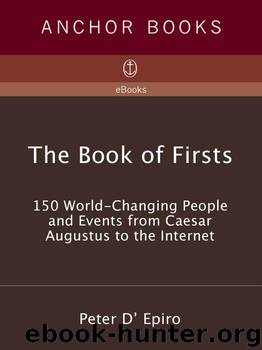The Book of Firsts by Peter D'Epiro

Author:Peter D'Epiro
Language: eng
Format: mobi, epub
ISBN: 9780307476661
Publisher: Knopf Doubleday Publishing Group
Published: 2010-12-21T21:00:00+00:00
95 Who wrote the first sonnets?
The Sicilian poet and court official Giacomo da Lentini, c. 1233
IN CANTO 24 OF THE PURGATORIO, Dante sees the soul of an earlier Italian poet doing penance for the sin of gluttony and uses the occasion to deliver himself of a little disquisition on what made his own love poetry so much better than that of his interlocutor—and of Giacomo da Lentini and yet a third Italian poet who is mentioned: the fact that Dante was truly inspired by the emotion of love, almost as if he were taking dictation from its personified god, whereas the others were mere imitators.
Indeed, the poetic style of Giacomo da Lentini (d. c. 1250), designated by his birthplace in east-central Sicily, is often pedestrian and drab and his syntactical structures shaky. The conventionality of his verse, which rings slight changes on the clichéd tropes of the Provençal troubadours, reminds us that Giacomo and his colleagues of the so-called Sicilian School of poetry—the earliest to write in Italian—were true amateurs. They all held down demanding day jobs as judges, chancellors, magistrates, and other busy officials for the Italian-born Frederick II—called “the Wonder of the World”—the erudite Holy Roman Emperor and king of Sicily whose brilliant roving court was often based in Palermo from about 1220 to his death in 1250. Frederick’s courtiers (and the king himself and his sons) dabbled in love poetry, especially in the form of the long, elaborate song known as the canzone, but writing poems remained for them an aristocratic refinement that rounded them out as accomplished gentlemen. Indeed, Giacomo was known as “the Notary,” a position vastly more prestigious than its modern counterpart.
Almost a third of about 125 surviving poems from the Sicilian School are by Giacomo da Lentini, many more than by any of his colleagues. He seems to have been the leader of the group, which included several other poets of considerable talent (not all Sicilians, but also including southern Italians and Tuscans). His greatest gift to posterity, however, was the invention of the intricately rhymed, fourteen-line poems known as sonnets (“little songs”), the first of which may well have originated as a stanza of an unfinished canzone that was then prized for its succinctness and cultivated as a separate form.
In an Italian sonnet’s first eight lines (the octet), a problem is posed or a situation established, which is then resolved, completed, contradicted, or commented on in the last six lines (the sestet). A common Italian rhyme scheme is abbaabba cdecde, but there are many variations. About twenty-five of Giacomo’s sonnets have survived, though not in their original Sicilian dialect but in later Tuscanized versions.
Many of his sonnets are marred by frigid conceits: He’s saturated with love—like a water-soaked sponge; he’s like a plucked lily when he’s away from his lady, rapidly fading away; like a moth to the flame, he doesn’t fear being consumed by his love, which will, in fact, renew him, as self-immolation did for the legendary phoenix. He’s tiresome
Download
This site does not store any files on its server. We only index and link to content provided by other sites. Please contact the content providers to delete copyright contents if any and email us, we'll remove relevant links or contents immediately.
Periodization Training for Sports by Tudor Bompa(8250)
The Body: A Guide for Occupants by Bill Bryson(5077)
The MacArthur Bible Commentary by John MacArthur(4822)
The Sports Rules Book by Human Kinetics(4377)
What It Really Takes to Get Into Ivy League and Other Highly Selective Colleges by Hughes Chuck(3742)
Marijuana Grower's Handbook by Ed Rosenthal(3675)
The Sprouting Book by Ann Wigmore(3583)
The Martian by Andy Weir(3411)
Salt, Fat, Acid, Heat: Mastering the Elements of Good Cooking by Nosrat Samin(3138)
The Bread Bible by Rose Levy Beranbaum(3064)
Sapiens and Homo Deus by Yuval Noah Harari(3061)
Harry Potter 4 - Harry Potter and The Goblet of Fire by J.K.Rowling(3057)
The Marketing Plan Handbook: Develop Big-Picture Marketing Plans for Pennies on the Dollar by Robert W. Bly(3045)
Classic by Mary Berry(3008)
Martha Stewart's Baking Handbook by Martha Stewart(2851)
Screenplay: The Foundations of Screenwriting by Syd Field(2634)
The Plant Paradox by Dr. Steven R. Gundry M.D(2608)
50 Economics Classics by Tom Butler-Bowdon(2568)
The Cambridge Grammar Of The English Language by Rodney Huddleston Geoffrey K. Pullum(2416)
